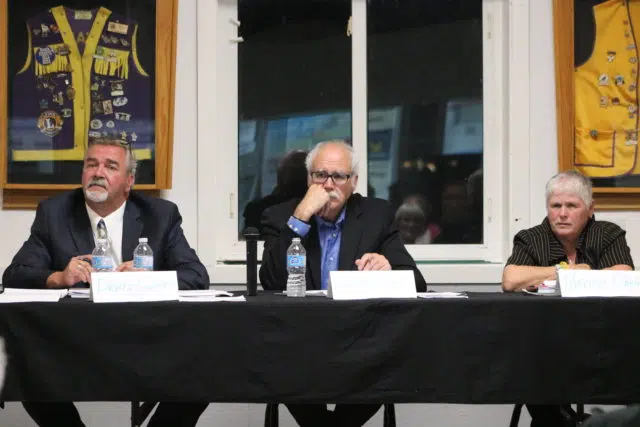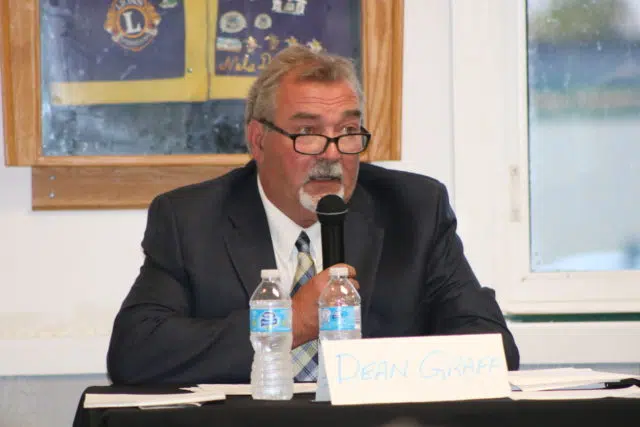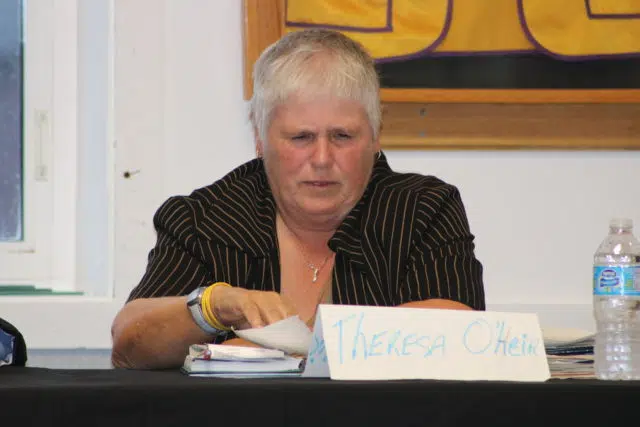
The three candidates running for mayor in Stirling-Rawdon (Dean Graff, Bob Mullin and Theresa O’Heir) took part in a debate at the Stirling Lions Hall, on September 27, 2018. (Photo: David Foot / Quinte News)
The three people vying for the mayor’s job in Stirling-Rawdon took part in an in-depth debate on Thursday night.
Bob Mullin, Dean Graff and Theresa O’Heir took almost 30 questions from a crowd of close to 100 people at the Stirling Lions Hall, with issues ranging from how to be more inclusive of citizens’ ideas, to perspectives on marijuana in the municipality and the protection of farm land.
Candidates opened the night with statements about themselves and their backgrounds.
You can click here to visit our Stirling-Rawdon candidates profile page and learn more about them.
How to be more inclusive and welcoming to citizens’ ideas
All three candidates agreed that more needs to be done when it comes to consulting and listening to the public, with O’Heir suggesting all council meetings should be recorded and the town’s website should be more informative. She says she’s always willing to talk to anyone and listen to ideas.
Graff said he doesn’t think council has been shutting people out, but feels like members of the public only show up to speak about negative things and urged more people to come forward with positive thoughts and ideas, before decisions are made. He also said meeting times should be pushed later in the day, so more people can attend.
Mullin echoed that sentiment and also suggested that posting council agendas online sooner might help get more people out to be a part of the decision making process. He says that communication is key and running the municipality is a “two-way street” with residents. He says people need to come to meetings because “we need to know what’s going on and get some direction” from citizens.
All three candidates also agreed with a suggestion to have a citizens group, or committee, that could keep an eye on things that are “good, bad, or indifferent” happening in the community and report regularly to council.
Improving Stirling-Rawdon’s financial situation
Mullin told the crowd that he was on the last council and “thinks we did a good job at moving forward” but completion of the asset management plan will be a key in getting the town back into good financial shape, so future councils have a plan.
Graff says “the first thing we need to do is eliminate the waste” and make sure good spending decisions are made. He says we have to look at how decisions are made because “we can’t keep doing things the way we have the last 40 years”.
O’Heir says she would go after lost revenue and agreed with Mullin that “we have to plan ahead and be prepared”.

Stirling-Rawdon mayoral candidate Dean Graff speaks during the Stirling Lions’ Hall, on September 27, 2018. (Photo: David Foot / Quinte News)
Views on medicinal and recreational marijuana
On the marijuana front, all three candidates said they were in favour of medicinal growth and distribution facilities setting up in town, as it’s a good source of revenue, but they also all agreed that more public consultation was needed before making a decision on allowing a recreational pot retail shop.
Protecting farmland from development
When it comes to protecting farmland, Graff says that agriculture is crucial to the town and he would do anything to protect it.
Mullin noted that prime agricultural land is already pretty well protected from any developments and O’Heir said she wants to keep as many farms and as much green space as possible, but they also have to find places to build more houses.

Stirling-Rawdon mayoral candidate Theresa O’Heir at the Stirling Lions Hall, on September 27, 2018. (Photo: David Foot / Quinte News)
Improving accessibility
When asked about how they would improve accessibility issues, Graff admitted that the town “has an accessibility problem” and that the best way to address it is to move as quickly as possible on funding improvement projects, before costs start to rise.
Mullin says he feels like the town is making those improvements step-by-step making sure those issues are taken into account when new projects are completed and helping businesses who are trying to make accessibility upgrades, but notes that it is a challenge.
O’Heir says she would push for more fundraising to help places like the Lions Hall get the upgrades they need so everyone can make use of them.
Addressing poverty
O’Heir pointed to taxes as one of the main factors in the local poverty and housing crisis saying “we can’t keep raising taxes all the time and we have to realize sometimes we just can’t do everything”. She says they need to push for more grants and adjust policies to make sure people have housing options like granny flats, or small homes.
Graff told the crowd it would be great if Stirling-Rawdon had its own “poverty round table” to discuss those issues and pointed to the good work of the Good Food Box program as one current way to help people who are struggling financially. But he says “it’s a serious question” that needs to be answered.
Mullin noted that the town already pays $1 million a year to Hastings County for social services but says there are some things the municipality can do to help. He says they will be working with Centre Hastings Transit to get a shuttle into Belleville, so people can work.

Stirling-Rawdon mayoral candidate Bob Mullin at the Stirling Lions Hall, on September 27, 2018. (Photo: David Foot / Quinte News)
Bringing more business downtown
O’Heir thinks high taxes are keeping businesses out of Stirling-Rawdon’s core and says “we need to figure out a new way of doing things” to attract new businesses.
Graff says the key to more businesses downtown is to beautify the area first. He says “if the downtown doesn’t look like it’s dying, people will keep coming back”. He also suggested approaching some smaller businesses, that don’t need a lot of space, to set up shop.
Mullin says he thinks more businesses could be attracted to town, but cutting taxes isn’t the answer. He says occupancy costs are the key, because lower rents can offset higher taxes.
Making much needed infrastructure improvements
Candidates were asked about improving crumbling infrastructure and putting potential weight limits on certain municipal roads.
Graff noted that Stirling-Rawdon is still trying to become a part of the Connecting Links program and they won’t be able to get funding from that if weight restrictions are put in place. But he says “it’s definitely a big issue” and something needs to be done.
Mullin also pointed to the negative effect on the Connecting Links program, which could provide crucial roads funding and says that’s the first thing to be dealt with.
O’Heir was in favour of weight restrictions and all three candidates agreed that they need to relentlessly push upper levels of government for more infrastructure funding.







